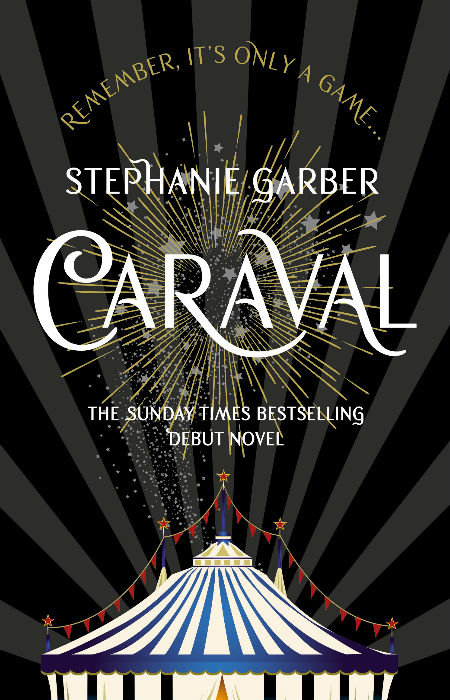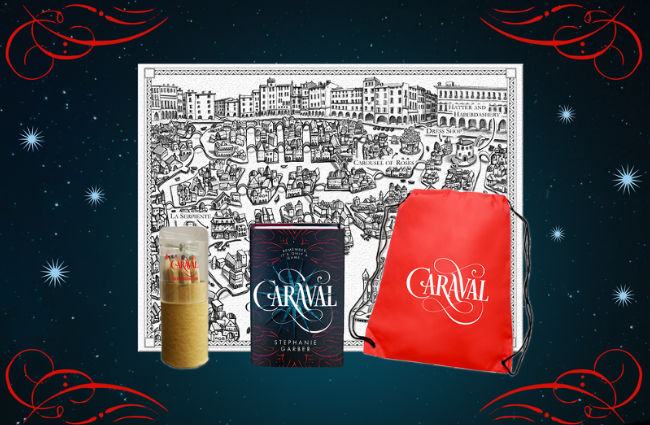
Just like life itself, Caraval is equal parts enchanting magic, and devious darkness, a journey into the very heart of humanity wrapped in a thousand colours of the rainbow.
Colour features strongly indeed in Stephanie Garber’s debut novel, which pivots on the idea that magic abounds around us if we look for it, and most particularly, if you are invited by a Machiavellian magician with extraordinary powers named Legend who holds a near-week long game called Caraval to which a select group of people from around the various empires and continents – this is very much a colonial-era setting with the hierarchies and attitudes that entails – to compete for a grand and rare prize.
It’s an event to which Scarlett Dragna, the daughter of a two-bit island governor with delusions of grandeur, and graphic cruelty to match, has long aspired to go with Caraval opening with a series of letters she has written over the years to the enigmatic, mysterious Legend begging to participate in the wonder and hedonism of a carnival that is equal parts Survivor meets The Amazing Race.
Enraptured by the bewitching escapism and the gilded sorcery, Scarlett has more reason than most to want the one wish prize (think a one-shot genie) that comes with winning the latest incarnation of Legend’s festival of lavish spectacle and gutter humanity – the setting is stunning; the people increasingly not – with the pressing need to escape her violently abusive father, with her younger sister in tow, growing more urgent by the day.
“‘Welcome, welcome to Caraval! The grandest show on land or by sea. Inside you’ll experience more wonders than most people see in a lifetime. You can sip magic from a cup and buy dreams in a bottle … So while we want you to get swept away, be careful of being swept too far away. Dreams that come true can be beautiful, but they can also turn into nightmares when people won’t wake up.'” (P. 75)
But when an invitation actually arrives for Scarlett and her more fiery, impetuous sister to go to Legend’s maquis extravaganza, the elder sister demurs, made low and small by years of abuse, her desire for escape and a new life, dwarfed by the simple crushing need to stay “safe”.
Through events that won’t be detailed here, she and her sister and a man who takes them to the island in his boat – adding to the ever-pervasive air of mystery, he just happens along when they need a ride and have a third ticket to the game – end up in the technicolour wonder and magic of a game which takes places only at night, with the day a wasteland of nothingness and loss.
One of the joys of this book is its extravagant use of colourfully-evocative language to describe the otherworldly, damn near paranormal delights of a world fundamentally removed from real life, one which comes with dazzling, sensory-overloading sights but which has, as you might expect, a rather dark underbelly.
That underbelly, seething with deception, death, loss, subterfuge and cruel cunning, is nowhere to be seen at first when passages like this one envelop you with gloriously-suffocating imagery that bursts alive in your mind as you read it:
“The canals were circular, like a long apple peel spread out around curving lantern-lit streets, full of pubs piping russet smoke, bakeries shaped like cupcakes and shops wrapped in colours like birthday presents> Cerulean blue. Apricot orange. Saffron yellow. Primrose pink.” (PP 137-138)
But, of course, deliriously delicious as all this language is, and it is cinematically transportive in the loveliest of ways, it is primarily used to build up the escapist nature of Caraval so that the narrative, in which Scarlett must find her sister while surmounting all kinds of near-devilish odds and obstacles, can tear down its diversionary magicality.
This is, as you might suspect a place of fairy floss, candy-coated artifice that hides the very rottenness of a corrupted soul – long-traded rumours tell of Legend essentially making a deal with the devil to gain his powers, an exchange that gifted him immense wealth, influence and power but which has left him cut off from his humanity, which is increasingly frayed and lost in the detritus of the lives he both builds and ruins with his carnival of competitively-lost souls.
Garber somehow manages to (mostly) hold the magic and raw nastiness of people like Legend and Dragna, who comes hunting for his daughter in Caraval to her understandable horror, in a tense balanace that has the novel feeling so much like life that you begin to feel as your own existence might be great staged event, its exact nature escaping you, just as it does Scarlett.
“Scarlett’s legs were boneless, thin skin wrapped around useless muscles. Her lungs ached with the pressure of unshed tears. Even her gown looked tired and dead. The black fabric had dulled to gray, as if it no longer had the strength to hold colour. She didn’t remember ripping the lace, but the hem of her bizarre mourning-nightdress hung in tatters around her calves. She didn’t know if its magic had stopped working or if it just reflected how exhausted and unraveled she felt.” (P. 250)
It doesn’t completely work with Scarlett making some rather questionable decisions in the service of the plot, and the finale as cruel to her in some ways as her life leading up to it – her acceptance of what is done to her in the service of the game leaves a little to be desired even if it is the product of someone who has the weary acceptance of the long-manipulated, but for the most part, Caraval is a brilliantly-realised, escapist tale that may be about illusion and artfully-curated imagination come to life, but which is, at its heart about abuse, and its harrowing effect on a person’s life.
Scarlett’s journey through the book is that of someone coming alive, belatedly realising, once free from her father’s brutally pernicious influence, that she can expect more from life than simply getting by, that her world can be as expansive and endlessly, colourfully beguiling as Caraval itself, if she’ll just let it.
In the end, any flaws aside, Caraval is a studied journey through not one but two hearts of darkness, a fabrication that seems magnificent and wondrous, and on the surface often is, with Garber’s extravagant descriptions well and truly doing it justice, but which, like humanity itself, can be as bitingly-nightmarish as it is whimsically fairytale-ish and magical.
Possessed of a steel spine and a balanced willingness to hold the dark and the light, the redemptive and the damning like some existential lady justice holding her scales aloft, and decorated in the many, vibrantly-hued colours of the rainbow, Caraval is a richly-written, immersive read that is as fey as it is substantial, an escape from the everyday that helps you realise that the power to change your life, whatever shape it takes, comes not from without, no matter how prettily-attired and promising it might be, but from within, which is where the real magic lies.
